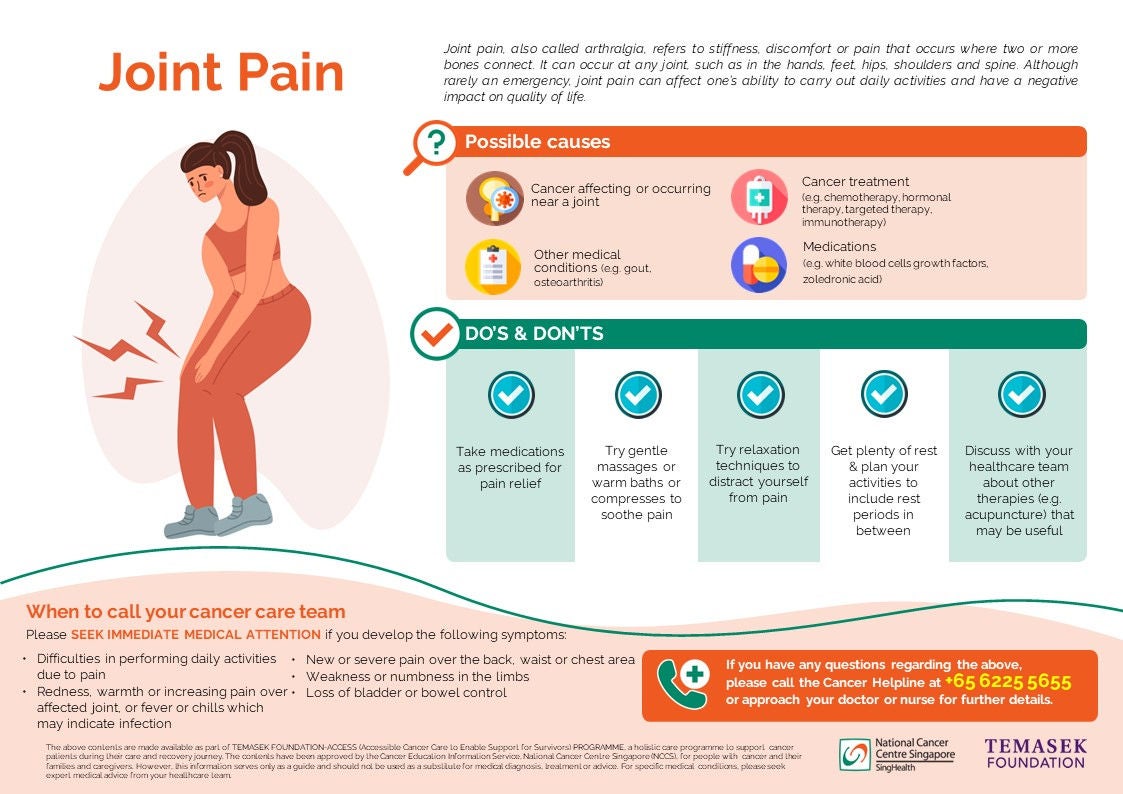National Cancer Centre Singapore will NEVER ask you to transfer money over a call. If in doubt, call the 24/7 ScamShield helpline at 1799, or visit the ScamShield website at www.scamshield.gov.sg.
Joint Pains (Arthralgia)
- Allergies
- Appetite Loss
- Bone Problems
- Breathing Problems
- Constipation
- Diarrhoea
- Difficulty Swallowing (Dysphagia)
- Dry Mouth (Xerostomia)
- Difficulty Sleeping (Insomnia)
- Feeling Tired (Fatigue)
- Fevers and Infections
- Hair Loss
- Heart Problems
- Menopausal Symptoms
- Indigestion
- Joint Pains
- Limb Swelling (Lymphedema)
- Muscle Aches
- Nail Changes
- Nausea and Vomiting
- Pain
- Tingling or Numbness in Hands or Feet (Peripheral Neuropathy)
- Skin Changes
- Sore Mouth (Oral Mucositis)
- Taste Changes

Joints are where 2 bones in our bodies connect to each other. Joint pain, also called arthralgia, is defined as discomfort or pain that occurs in any joint of our body. It can be due to non-cancer causes like arthritis or gout, but is also a possible side effect of cancer and its treatment. For many people, joint pain is often accompanied by muscle pain, and can range from mild to severe.
Although rarely an emergency, joint pains can lead to fatigue and affect a person’s ability to carry out his or her daily activities. To reduce impact on your quality of life, it is important to inform your doctor or nurse promptly if you develop any joint pains.
Causes of Joint Pain
- Cancer occurring in or near a joint
- Some types of chemotherapy (e.g. paclitaxel, docetaxel)
- Hormonal therapy (e.g. letrozole, tamoxifen)
- Targeted therapy (e.g. olaparib)
- Immunotherapy (e.g. pembrolizumab, nivolumab)
- Other medications (e.g. white blood cell growth factors, zoledronic acid)
- Unrelated to cancer and its treatment (e.g. gout, osteoarthritis, infection)
What you need to look out for
The duration and area of joint pain can vary from person to person. Some symptoms you may experience include:
- Pain in any joint, whether moving or resting
- Stiffness, or difficulty bending or moving the joint fully
- Feeling fatigued
- Feeling low in your mood
How it can be treated
Your doctor will first determine the cause of your joint pain, by examining your joint and asking you more questions about the pain. The cause and treatment for joint pains in one specific area can be different from joint pains affecting multiple areas. Additional tests (e.g. xrays, blood tests) may be arranged if necessary. Based on the cause of the pain, your doctor may:
- Prescribe medications to help manage the pain. These may include paracetamol and nonsteroidal anti-inflammatory drugs like celecoxib to relieve pain, corticosteroids to help decrease inflammation and swelling, and/or antibiotics for joint infection if any.
- Refer you to see a rehabilitation specialist, physiotherapist or occupational therapist, who may recommend medications, acupuncture, exercises or assistive aids to help you manage the joint pains and stiffness.
What you can do
Here are some tips to help you cope better if you experience any joint pains:
|
|
When to call your cancer care team
Please inform your doctor or nurse as soon as you develop the following symptoms that may indicate worsening or complications of the condition.
- Persistent moderate to severe joint pains or difficulty in performing your day to day activities, despite taking medications and measures listed above
- Redness, warmth or worsening pain over any joint, or fever or chills which may indicate infection
- New or severe back pain with the following symptoms:
- Weakness and/or numbness in the lower body
- Pain around waist or chest
- Loss of bladder or bowel control
The above indicates possible spinal cord compression, A MEDICAL EMERGENCY which requires IMMEDIATE MEDICAL ATTENTION: please go to your nearest hospital as soon as possible. Delayed treatment may result in long term disability.
If you have any questions regarding the above, please call the Cancer Helpline at +65 6225 5655 or approach your doctor or nurse for further details.
Click here to download the PDF version of this article.
如果您要下载本文的中文版本,请点击此处。
Klik di sini untuk memuat turun versi PDF artikel ini.
The above contents are made available as part of TEMASEK FOUNDATION-ACCESS (Accessible Cancer Care to Enable Support for Survivors) PROGRAMME, a holistic care programme to support cancer patients during their care and recovery journey.
The contents have been approved by the Cancer Education Information Service, National Cancer Centre Singapore (NCCS), for people with cancer and their families and caregivers. However, this information serves only as a guide and should not be used as a substitute for medical diagnosis, treatment or advice. For specific medical conditions, please seek expert medical advice from your healthcare team.
Brought to you by:
![]()
![]()
Keep Healthy With
© 2025 SingHealth Group. All Rights Reserved.

















